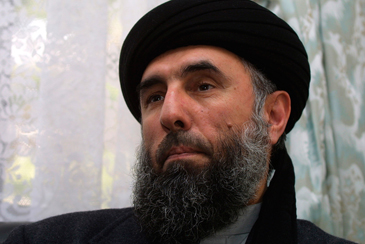Feb 5: The United Nations has lifted sanctions against Gulbuddin Hekmatyar, the leader of the Hezb-i-Islami group in Afghanistan and one of the most infamous figures in the country's civil war in the 1990s.
 The decision by the UN Security Council late on Friday follows a peace deal signed by the Afghan government and Hekmatyar's largely dormant group in September.
The decision by the UN Security Council late on Friday follows a peace deal signed by the Afghan government and Hekmatyar's largely dormant group in September.
The accord gave Hekmatyar amnesty for past offences and granted him full political rights. It also allowed for the release of certain Hezb-i-Islami prisoners.
In a statement, the Security Council said it had dropped a freeze that had been put on Hekmatyar's assets, as well as a travel ban and an arms embargo against him.
Hekmatyar was one of the most influential leaders in the fight against Soviet forces in the 1980s. He briefly accepted the position of prime minister in an administration following the collapse of a Soviet-backed government in 1992.
Once branded as "the butcher of Kabul", Hekmatyar was accused of killing thousands of people when his fighters fired on civilian areas of the capital, Kabul, during the country's 1992-1996 civil war.
Hekmatyar's whereabouts are unknown, but Ghairat Baheer, Hezb-i-Islami's chief negotiator, told Al Jazeera that, with the sanctions now removed, he would eventually return to the Afghan capital.
"Hekmatyar is in hiding in Afghanistan, but after the UN move he will soon make an appearance in one of the provinces and will later come to Kabul," Baheer said.
The UN's decision could pave the way for other armed groups, such as the Taliban, to enter peace negotiations, according to Baheer.
He also urged the Afghan government to implement September's peace accord "completely and honestly" and called against the interference of foreign powers in Afghan affairs.
"Peace is [more] difficult to achieve than war, and we have done that, we have taken steps to achieve peace in Afghanistan," he said.
NATO forces officially ended their combat mission in December 2014. Yet, in July last year, US troops were granted greater powers to launch strikes against Taliban fighters as former President Barack Obama vowed a more aggressive campaign.
The US still has about 8,400 troops in the country.
Habiburrahman Hekmatyar, son of Gulbuddin Hekmatyar, hailed the lifting of the sanctions as "a very big decision that will change the entire situation of Afghanistan".
"Every Afghan has suffered through decades of war and conflict, and everyone has sacrificed a lot in this war, including us, so I urge every Afghan to look forward and believe that we are working towards peace," he told Al Jazeera.
But others, including human rights groups and ordinary Afghans, criticised the peace accord and the subsequent lifting of the sanctions against Hekmatyar.
"He just wants to have a political position for his family and for his party members in Afghanistan. He is the killer of the people of Afghanistan, it will be difficult to change this point of view of people about him," Sami Darayi, a Kabul resident who lost his uncle in the civil war, told Al Jazeera on Saturday.
"He did not even apologise to us Afghans, he never said he committed a mistake by killing innocent people."
Others, like Kabul-based Khalid Amini, who lost his father by one of the Hekmatyar's fighters, told Al Jazeera that "as long as it brings peace in the country, I have no problem with him making a return".
"I remember my father's death, but I want to look forward, I want to look after my family and live in a peaceful environment. So, I want peace and he should bring that to the country now," he said.
Many foreign governments, including the US, praised the accord at the time as a step towards wider peace in Afghanistan.
But Human Right Watch, a New York-based watchdog, had branded Hekmatyar "one of Afghanistan's most notorious war crimes suspects" and said his return would "compound a culture of impunity" that has denied justice to the many victims of his forces.





Comments
Add new comment